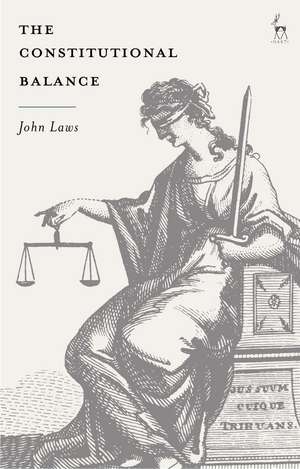The Constitutional Balance
Autor Sir John Lawsen Limba Engleză Hardback – 27 ian 2021
| Toate formatele și edițiile | Preț | Express |
|---|---|---|
| Paperback (1) | 132.26 lei 6-8 săpt. | |
| Bloomsbury Publishing – 29 noi 2023 | 132.26 lei 6-8 săpt. | |
| Hardback (1) | 319.83 lei 6-8 săpt. | |
| Bloomsbury Publishing – 27 ian 2021 | 319.83 lei 6-8 săpt. |
Preț: 319.83 lei
Preț vechi: 391.16 lei
-18% Nou
Puncte Express: 480
Preț estimativ în valută:
61.24€ • 62.82$ • 51.56£
61.24€ • 62.82$ • 51.56£
Carte tipărită la comandă
Livrare economică 26 februarie-12 martie
Preluare comenzi: 021 569.72.76
Specificații
ISBN-13: 9781509935451
ISBN-10: 1509935452
Pagini: 168
Dimensiuni: 156 x 234 x 18 mm
Greutate: 0.42 kg
Editura: Bloomsbury Publishing
Colecția Hart Publishing
Locul publicării:London, United Kingdom
ISBN-10: 1509935452
Pagini: 168
Dimensiuni: 156 x 234 x 18 mm
Greutate: 0.42 kg
Editura: Bloomsbury Publishing
Colecția Hart Publishing
Locul publicării:London, United Kingdom
Caracteristici
Considers the debate on whether or not judges venture too far into issues of Government policy
Notă biografică
John Laws was First Junior Counsel to the Treasury, Common Law (1984-92), High Court Judge (1992-99), Lord Justice of Appeal (1999-2016) and Goodhart Professor of Legal Science at Cambridge University (2016-17).
Cuprins
Introduction I. The Vice of Ideology II. Three Aspects of the Human Condition III. Three Constitutional Fundamentals: The Constitutional Balance IV. The Scheme of the Book V. Reflections1. The Rule of Law I. Two Meanings of the Rule of Law II. The Rule of Law - Where Next?III. Independent and Impartial Adjudication IV. Beyond the Th in Theory V. Unison v Lord Chancellor VI. Two Basics: Normative Statutory Interpretation and the Individual's Autonomy VII. Possible Objections VIII. Examples IX. Conclusions 2. Democracy I. The Virtue of Democracy (1): Failed Candidates II. The Virtue of Democracy (2): Its True Virtue III. Referendums IV. Conclusion - Restraint 3. Two MoralitiesI. The Nature of the Two Moralities A. The Natural Provinces of Courts and Government B. The Two Philosophies are Apt to their Respective Spheres C. The Methods of Courts and Government are Suited to their Respective Moralities D. The Two Moralities and the Constitutional Balance II. Trespass A. Criminal Law B. Trespass by Government C. Trespass by Courts III. Justice IV. Postscript 4. The Common Law I. Constitutions II. Statute Law III. The Common Law and Statutory Interpretation IV. The Constitutional Balance V. The Methods of the Common Law A. Precedent B. Experiment C. History D. Distillation E. Conclusions 5. Reason, Fairness and the Presumption of Liberty I. Reason - Wednesbury and Proportionality A. Wednesbury i. A Variable Standard of Review B. Proportionality II. Fairness - Ridge v Baldwin; Legitimate Expectation A. Ridge v Baldwin B. Legitimate ExpectationC. Overriding Public Interest III. The Presumption of Liberty A. Two Propositions B. The Presumption of Liberty and the Rule of Law C. The Principle of Minimal Interference IV. Postscript - Forerunners of Judicial Review 6. Finding the Edge: Judicial Deference I. Introductory Cases II. Lord Hoffmann in the ProLife Case III. Why Should the Courts Defer to Democratic Power? 7. Two Mistakes: Parliamentary Intent and the Ultra Vires Doctrine I. The Intention of Parliament A. The Type-Token Distinction B. Can Parliamentary Intention be Saved? (1) C. Can Parliamentary Intention be Saved? (2) i. Pepper v Hart ii. Interpreting Contracts and Statutes D. Intent and Purpose E. An Irony F. The Constitutional Principles II. The Ultra Vires Doctrine A. The Nature of the Ultra Vires Doctrine B. Objections to the Ultra Vires Doctrine C. Modified Ultra Vires D. Shortcomings of the Modified Theory 8. The Sovereignty of Parliament I. Constitutional Statutes and Implied Repeal II. The Nature of Parliamentary Sovereignty III. Assaults on the Constitutional Balance IV. Auctoritas and Imperium 9. Human Rights, Free Thought and Expression I. Human Rights A. Problems for the Constitutional Balance: The ECHR and the Strasbourg Jurisprudence B. The Human Rights Act C. Consequences D. The Ullah Case E. Ullah in Retreat II. Free Thought and Expression A. Free Expression under Attack B. Offensive Speech C. Religion i. The McFarlane Case
Recenzii
The Constitutional Balance is an excellent book. It represents the culmination of a lifetime of deep thinking about the nature of UK constitutional law. Anyone remotely interested in constitutional theory should read this book . this book warrants careful reading by anyone working in constitutional theory and will be an invaluable resource for students . Laws has managed to provide a thoroughly accessible book that is nevertheless nuanced and insightful. A fitting final publication for a man whose writing has always struck that balance so well.
